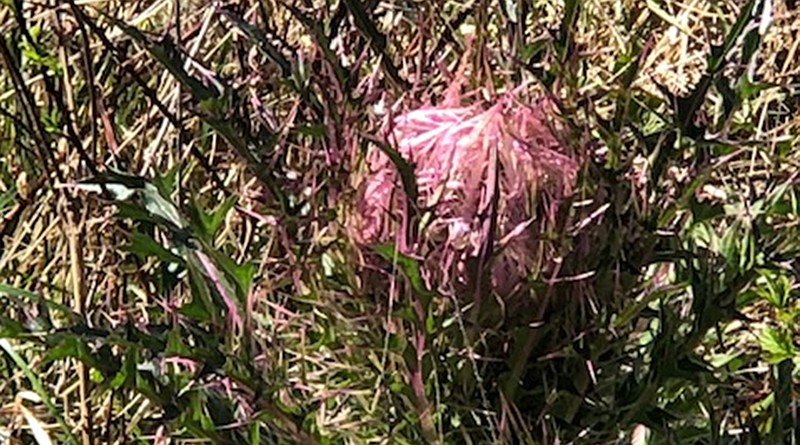Q This plant is growing in a dormant pasture. I've never seen a bloom such as this.
A I am going out on a limb, but I think it is a thistle. The flower head it usually in a more rounded form, but it could have been laid low by heavy rain. The foliage surrounding it and the color make me think thistle — not a good weed (or wildflower) for a pasture. The foliage has many thorns, and it can spread.
Q Here is a picture taken March 27 of my holly bushes. I have five, and they all look freezer burnt to me. What are the chances they will recover? They are what I call "foundation plantings" as they are close to my front entryway. If they are past hope will I need to grind out the roots or just cut off at ground level? Thanks for any tips and ideas for what to replace them with if needed. I like color and flowers.

A I am not ready to throw in the towel on anything just yet. Some plants I thought were beyond hope are starting to show signs of life in my yard, and some are not. If they are focal points in the landscape, you might want to bite the bullet and replace them. Slow recovery might take more time than it is worth for you. I would be extremely surprised if a holly was killed. I am even a bit surprised that it was so damaged, since the hollies in many yards I have seen are not on the damaged-plant list. It is really a personal decision. I have many loropetalum that are totally brown and yet a fifth of the branches have bright pink flowers at the top — so there is life in them. Patience is going to be needed for many of our plants but, again, if they are an integral part of the landscape, replacement could be a better choice. As for replacement options, before making suggestions, I need to know whether the site is in full sun or shade. What is the maximum height needed?
Q Silly question, but is there such a thing as suet that squirrels don't like? My recipe calls for peanut butter, lard, oats and cornmeal. It would be nice to know if there was something I can put in there that the birds love but squirrels don't.
A Try adding some cayenne pepper to the mix. I bought some bird seed with the pepper added in and the squirrels won't touch it.
Q We bought a live Meyer lemon tree plant. Is it best to plant in a large container/pot, or into the ground (full sun)? The plant is now 10 or 12 inches tall in a 2-gallon pot.
A I would put it in a large container. While Meyer lemons are one of the hardiest lemon varieties, I daresay they would have perished outdoors this past February. I would want the option of moving them to a more protected spot in the coldest periods.
Q Please help! I know you have written before on how to treat this kind of damage to a Camellia shrub because I remember having read the solution. However, now that my formerly beautiful bush is suffering, I can't find the article. This is a current photograph. Will you please tell me what to do?

A Your camellia is not suffering winter damage, as many of our other questions were about, but rather insect damage — tea scale. I think if you turn the leaves over you will find them covered in small white insects. These scale insects attach themselves to the bottom of the leaves and suck the sap out of the foliage. This can result in mottled foliage on top, and eventually the sticky residue the insects exude, called honeydew, will cover the leaves in black soot. Systemic insecticides are the best control.
Retired after 38 years with the University of Arkansas Cooperative Extension Service, Janet Carson ranks among Arkansas' best-known horticulture experts. Her blog is at arkansasonline.com/planitjanet. Write to her at P.O. Box 2221, Little Rock, AR 72203 or email [email protected]

